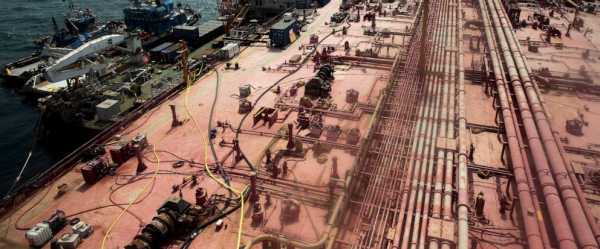
UNITED NATIONS — The transfer of more than a million barrels of oil from an aging tanker moored off the coast of war-torn Yemen has been completed, avoiding an environmental disaster, the United Nations said Friday.
In a statement, Farhan Haq, the deputy spokesman for U.N. Secretary-General Antonio Guterres, said the operation had prevented a “monumental environmental and humanitarian catastrophe.”
An international team began siphoning the oil from the dilapidated vessel known as FSO Safer on July 25. Almost all the oil is now aboard a replacement tanker called MOST Yemen.
Before the transfer, the Safer, which Yemen used as a floating storage and offloading facility, held four times as much oil as was spilled in the 1989 Exxon Valdez disaster off Alaska, one of the world’s worst ecological catastrophes, according to the U.N.
International organizations and rights groups warned for years of the potential for a spill or an explosion involving the tanker, which had not been maintained and has damaged pipes and seawater in its engine compartment.
“Today, we can say that the United Nations and a remarkably broad group of partners have succeeded in preventing the worst case scenario of a catastrophic oil spill in the Red Sea," David Gressly, the U.N. humanitarian coordinator in Yemen, said.
It is moored 6 kilometers (3.7 miles) from Yemen’s western Red Sea ports of Hodeida and Ras Issa, a strategic area controlled by the Iran-backed Houthi rebels who are at war with the internationally recognized Yemeni government.
The warring sides blamed each other for blocking a salvage operation to remove the oil until a U.N.-led initiative succeeded in accessing the ship and raising money from international donors.
The transfer marks a major milestone in a plan that needs additional funding to transport the oil away and to move the Safer. The U.N. said a small amount of oil remains inside the Safer's hull and that the salvage team needs to install a secure system for mooring the replacement tanker in deep water.
“As much of the 1.14 million barrels has been extracted as possible,” the U.N. statement said. “However, less than 2% of the original oil cargo remains mixed in with sediment that will be removed during the final cleaning of the Safer.”
Gressly told U.N. reporters at a video news conference from Yemen that during the cleaning phase a sea water wash will be applied “to extract as much liquid oil as possible,” and the oil-mixed sediment will then be removed at another port. It is unclear how long this next phase will take.
The United States welcomed the news of the operation's success and called on other countries to contribute to see the job through to the end.
“The U.N. urgently needs the international community and private sector’s financial support to fill the remaining $22 million funding gap needed to finish the job and address all remaining environmental threats,” U.S. Secretary of State Anthony Blinken said.
The tanker, a Japanese-made vessel built in the 1970s, was sold to the Yemeni government during the 1980s to store for export up to 3 million barrels pumped from oil fields in eastern Yemen's Marib province. The ship is 360 meters (1,181 feet) long with 34 storage tanks.
Peter Berdowski, CEO of maritime services company Boskalis, said the Safer's former cargo was now inside a “modern double-hulled tanker.” The U.N. contracted a Boskalis subsidiary, SMIT Salvage, to remove the oil.
He congratulated the company's salvage team for "carrying out the work under very challenging conditions in the Red Sea.”
Yemen’s ruinous civil war began in 2014 when the Houthis seized the capital of Sanaa and much of northern Yemen and forced the government into exile. A Saudi-led coalition, including the UAE, intervened the following year to try to restore the internationally recognized government to power.
“In the midst of a conflict zone, remarkable things become possible. Many thought this was an impossible salvage operation,” said Adam Steiner, chief of the U.N. Development Program, said during the U.N. news conference.
Steiner, noting that some people had described the Safer tanker as a ticking time bomb, said, “I think it is fair to say that as of today, that ticking is no longer an immediate threat.”
___
Jeffrey reported from Cairo.
Sourse: abcnews.go.com






